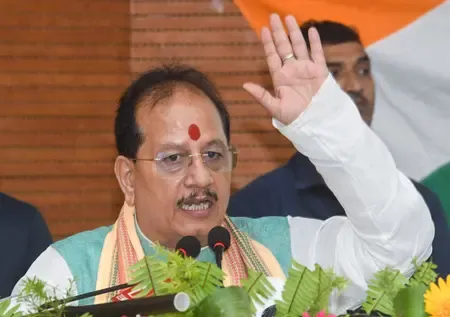Did Tejashwi Yadav Cross the Line with His Remark on Journalists?

Synopsis
Key Takeaways
- Tejashwi Yadav's remarks have sparked significant political backlash.
- BJP and JD-U leaders have criticized his language as inappropriate.
- Concerns about the integrity of electoral processes have been raised.
- The incident reflects broader issues of media respect in politics.
- Political rhetoric is increasingly becoming more divisive.
New Delhi, July 14 (NationPress) RJD leader Tejashwi Yadav has ignited a political controversy with his provocative comment equating “sources,” a standard term in journalism, to “mutra” (urine) while addressing a question regarding the supposed inclusion of illegal migrants in Bihar's electoral rolls.
This statement, made during a press conference, has attracted fierce backlash from various political factions, particularly from BJP and JD-U representatives, who have accused him of undermining democratic dialogue and disrespecting the journalistic community.
In response to Tejashwi’s choice of words, Bihar's Deputy Chief Minister Vijay Kumar Sinha remarked, “These individuals have forsaken their values and become estranged from Indian traditions and culture. Their language is a reflection of a polluted environment. This attitude has led both father and son to damage Bihar’s image. True Biharis, with pride and integrity, strive to preserve and promote their heritage.”
BJP MP Praveen Khandelwal also expressed his disapproval of Tejashwi's language:
“The language employed by Tejashwi Yadav was utterly inappropriate. The individuals referenced clearly indicate that the Election Commission’s actions were warranted. Many ineligible persons had been registered as voters, necessitating a revision of the electoral list.”
Former Union Minister and senior BJP leader Mukhtar Abbas Naqvi criticized the opposition for supporting illegal immigrants.
“Whether it involves Tejashwi’s party or the Congress, those advocating for illegal infiltrators, who are now being recognized as legitimate voters, are compromising the rights of Indian citizens. These illegal entrants from Bangladesh and Myanmar are detrimental to India’s own Muslim community, taking away their rights. They are a strain on the nation's resources, and any form of protection for them is unjustifiable,” he stated.
In a pointed critique, JD-U spokesperson Neeraj Kumar charged Tejashwi with belittling the media, “The media, as the fourth pillar of democracy, is entitled to report news based on sources. However, your use of vulgar language indicates a deficiency in character. This reflects your associations and suggests such indecency may also permeate your home life.”






